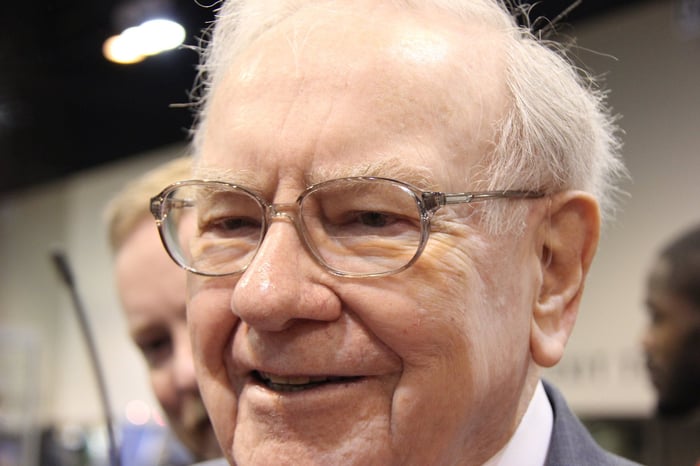Warren Buffett, Berkshire Hathaway's (BRK.A 1.18%) (BRK.B 1.30%) chief executive officer and chairman, has been investing since the age of 11. That's more than eight decades for those keeping score. With his net worth at nearly $100 billion, the understatement of the century would be to say that Buffett knows a thing or two about investing.
This is why it's worth paying attention to the holdings within Berkshire Hathaway's $344 billion investment portfolio. Here are three picks with strong fundamentals and bright futures that stand out as shrewd buys for retail investors.

Image source: Getty Images.
1. Johnson & Johnson
As the healthcare sector innovates and developing nations mature economically, life expectancy is expected to increase still further. It's projected that average global life expectancy will surge higher from 71.7 years in 2022 to 77.2 by 2050. Longer lives will also lead to population growth, which will translate into a larger potential customer base for Johnson & Johnson (JNJ 1.49%).
With blockbuster medicines such as immunology drugs Stelara and Tremfya, an anti-psychotic drug franchise known as Invega, and ancer drug Darzalex, J&J has had no shortage of commercial successes in recent years. This explains why the analyst consensus is that J&J will report an astonishing $95.1 billion in revenue for the current year.
And since the company had 99 projects under clinical development as of July in various therapeutic areas -- including infectious diseases and vaccines, immunology, and oncology -- the future appears to be promising. This blend of existing products and potential launches spells out why analysts are predicting 4.1% annual earnings growth from the company through the next five years.
J&J's 2.8% dividend yield is significantly higher than the S&P 500 index's 1.6% yield. And based on the fact that the Dividend King's payout ratio will be around 44% in 2022, investors can be confident that the dividend will keep increasing in the years ahead.
Berkshire Hathaway's stake in the healthcare company is minuscule at $53 million. But J&J is a world-class business trading at a relatively cheap valuation. The stock's forward price-to-earnings (P/E) ratio of 16 is only slightly above the S&P 500 healthcare sector average of 15.4.
2. Mastercard
Having processed $8.1 trillion in transactions in the last four quarters, Mastercard (MA 0.15%) is a giant in the world of payments processing -- and the pandemic has only encouraged greater use by its customers.
Cash use remained under pressure during COVID-19. Given that consumers preferred to use contactless, digital payment methods to reduce their risk of exposure to the virus, it isn't surprising that U.S. cash use dipped over 20% from 2018 to 2020.
Even as the pandemic eventually comes to an end, cash will still likely be displaced over time due to the rise of e-commerce and the convenience of alternative payments.
And that's precisely why analysts believe that Mastercard's earnings will compound at a rapid rate of 22.8% annually for the next five years. These factors are why it isn't surprising to learn that Berkshire Hathaway owns a $1.3 billion stake in the payments processor.
For those who don't need immediate income from their investments, Mastercard's 0.6% dividend yield is an excellent pick. That's because, in addition to its tremendous earnings growth prospects, the company's dividend payout ratio will come in below just 19% in 2022.
Mastercard should see a doubling of its dividend every four or five years for the foreseeable future. Best of all, the stock's forward P/E ratio of about 30 is reasonable for a company with such impressive growth potential.
3. United Parcel Service
Delivering 23.1 million packages a day on average during the second quarter, United Parcel Service (UPS 0.02%) is the largest package delivery company on the planet. Aside from the largest e-commerce retailers themselves, nobody will benefit from the encouraging e-commerce industry outlook more than UPS.
It's forecast that global e-commerce retail sales will soar from $4.9 trillion in 2021 to $7.4 trillion by 2025. That's countless millions more packages every day that will need to be delivered. With UPS investing billions every year to upgrade its delivery capacity, there's a high chance that the company will capture a plurality of these additional packages. This is why analysts are predicting that UPS will deliver 5.7% annual earnings growth over the next five years.
And with the dividend payout ratio at 48%, the company's dividend should have no issue growing in the years to come. Along with its 3.2% dividend yield, this makes UPS an attractive dividend growth stock. Admittedly, Berkshire Hathaway's position is small at just $12 million. But with a forward P/E ratio of only 15.2, UPS looks interesting at its current $193 share price.





